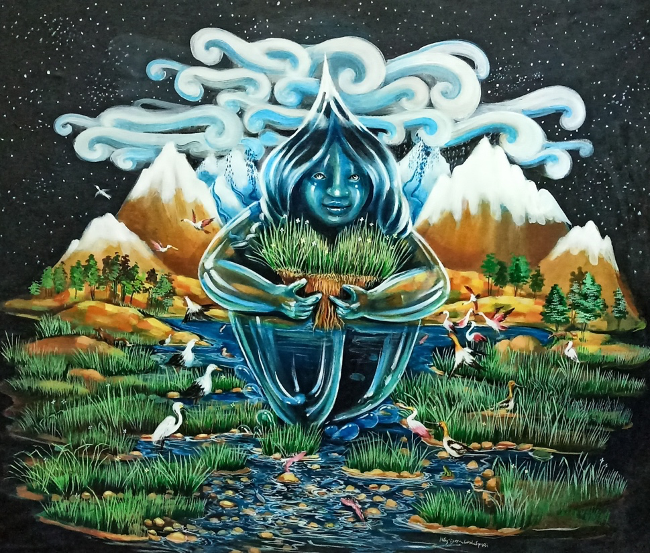
Artwork: Natalia Eddem Lizárrage, Gotita de agua (water droplet). Made for “Forest Trends event”.
Grassroots is a publication platform designed for environmental activists and scholars focused on environmental justice, sustainable politics, pluriverse possibilities, resource access struggles, and related social inequalities in both rural and urban contexts.
In the midst of a global environmental crisis, the objective of this platform is to reveal and circulate local experiences, stories and reflections on the politics of environmental change and world making that can spark political and academic debate. We believe that this type of platform has the potential to inform and contribute to transforming the way in which we do political ecology today, as well as to strengthen the ties between social movements and academia. We welcome individual or collaborative work between activists and political ecologists or related social scientists at any stage of their careers. This work can take the form of activist pieces, academic reflections, engaged scholarship or creative work addressing political ecology debates that are based on particular cases or rooted in direct experience.
We are interested in grassroots’ initiatives that envision sustainable ways of inhabiting and co-constructing the planet as well as critical reflections on political ecology, political ontology and environmentalism. We are also interested in the challenges of sovereignty, environmental conflicts and ontological equivocations faced by local populations when attempting to influence the way in which natural resources are governed in particular settings. We publish short case studies of local resource governance and other-than-human relations, effects of globalisation in domestic politics, multi-scalar strategic alliances between grassroots movements, as well as explicit and implicit processes of environmental awareness-building and resistance. We invite pieces in a variety of formats, including written articles and visual essays based on pictures, videos, interviews or other creative expressions.
The urgency of the global sustainability issues we are currently confronted with, demands that we listen to all voices including those that have been marginalized in the Global South. While our objective is to provide a space for debate, we do not attempt to further any particular interest or adopt any specific position. Thus, we encourage the publication of dissenting grassroots’ voices. The opinions of the authors are entirely their own and do not reflect the position of JPE. The pieces published in this section are first evaluated by the editorial board of the Journal and are then reviewed by one external referee.

The artwork on our home page is by Angie Vanessita, an Ecuadorian artist whose art is inspired by the work of indigenous, afrodescendent, campesino and rural communities who defend their territories against the advance of capitalist extractivism. To discover more of her art we invite you to visit her website.
We chose her piece Noche Manglar (Mangrove at Night) because it reflects the multispecies connections that exist between humans and more-than humans: the bird gazing at the horizon, a crab exploring the aerial roots that emerge from the sea, the silhouette of two humans whose limbs become mangrove, all of them engulfed by what appears to be the spirit of the pacific coastal forest. At the center of the picture, the mangrove recalls grassroots movements who struggle for the survival of their communities. Mangroves grow in harsh conditions. In salty and low oxygen environments, they create root structures that host life, prevent erosion and absorb the impact of storms during extreme weather. Like mangroves, we believe that environmental grassroots movements are also anchored in local ecologies, defend life beyond the human, and create networks of resistance against environmental injustice and exploitation. Grassroots is a platform for social mangroves, interconnected roots that prevent planetary erosion and that extend out their arms in search of more sustainable futures.